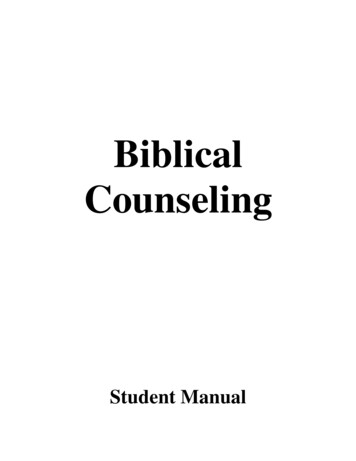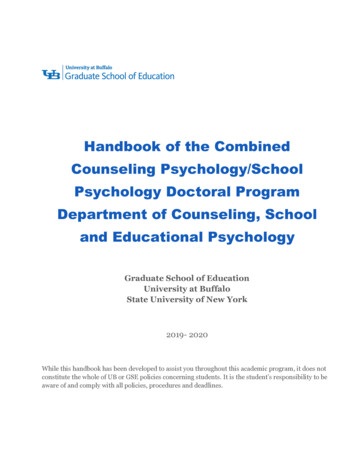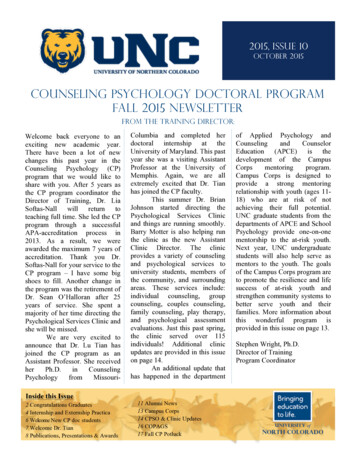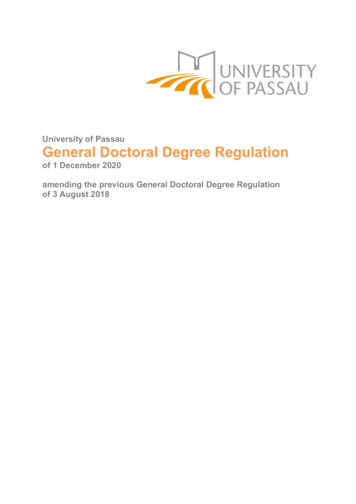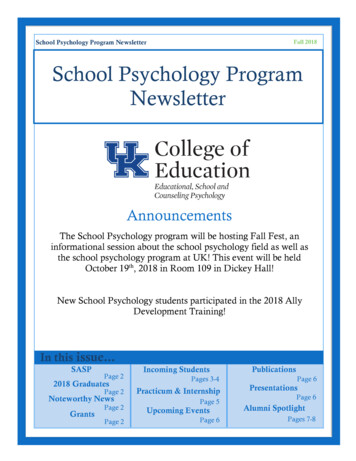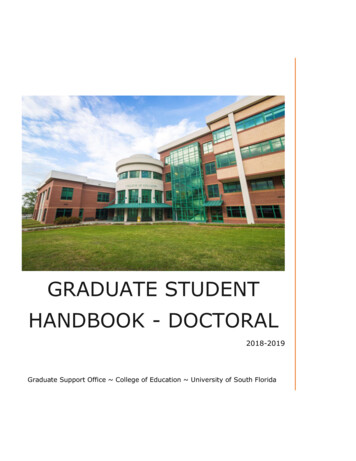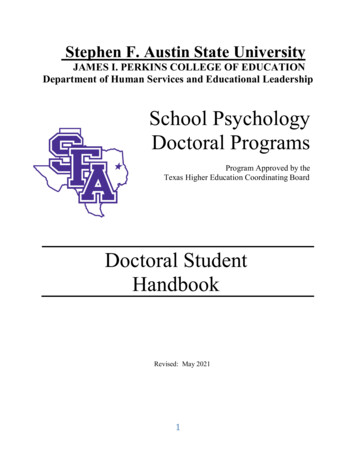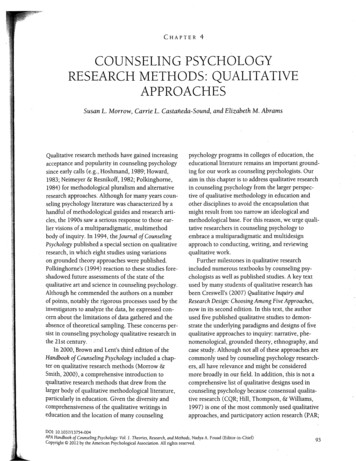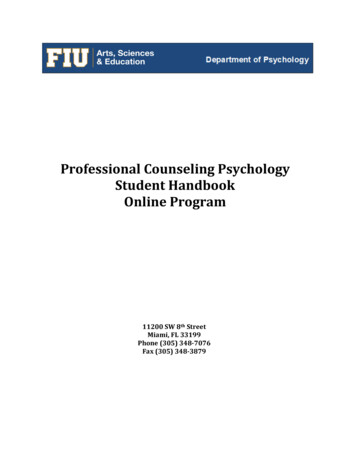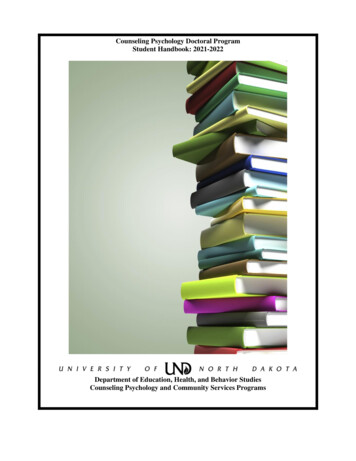
Transcription
Counseling Psychology Doctoral ProgramStudent Handbook: 2021-2022Department of Education, Health, and Behavior StudiesCounseling Psychology and Community Services Programs
Table of J.K.L.M.N.O.P.VI.VII.VIII.IX.Introduction . . 1Program Philosophy . . 2Program Aim . 3A. Table 1: Standards of Accreditation (SOAs) of the AmericanPsychological Association Implementation at the Universityof North Dakota Doctoral Program in Counseling Psychology . 4B. Table 2: Specialization Area . 19Training Model . 21Collegial, Supportive, Inclusive, and Just Learning Environments . 21Self-Disclosure . 22Diversity, Inclusion, and Social Justice Training Values 23Advising . 23Program of Study . . 23Degree Requirements . 24Coursework in Counseling Psychology . 25Coursework in Public Health or Interprofessional Health Care . 26Coursework in Discipline Specific Knowledge . . 27Coursework to Research Foundations . . . 27Coursework to Fulfill Two Scholarly Tools . . 27Specialization Area . 28Research Mentorship Sequence . . 28Teaching Experience . 29Social Justice Project . 29Professionalism Benchmark . 30Accumulation of Supervised Experience in Practice Settings . 31Behavioral Healthcare Rotation . 33Observed Structured Clinical Examination . 35Successful Completion of Comprehensive Examinations . 36Successful Completion of Dissertation . 40Internship . 42Evaluation, Progress, and Continuation in the Program . . 42Student Grievance Procedures and Policies . 44A. Discrimination and Sexual Harassment Grievances . 44B. College of Education and Human Development AcademicConcerns and Grievance Policy 45C. Informal Grievance Options . 45Faculty . 44A. Core Faculty in Counseling Psychology . 45B. Other CPCS Faculty Working with Ph.D. Students 46Resources and Support . 47A. Financial Support . 47B. CPCS Graduate Assistantships 47C. Assistantships Elsewhere at UND . 48D. Other Sources of Support . 48E. University Support Services . 48F. Library Resources . 49G. Professional Affiliations . 50ii
X.XI.XII.XIII.XIV.XV.XVI.Recruitment and Retention Policy . . 51Records Retention Policy . . 52Complaints and Grievances Record Policy . . 53Background Check Policy . 53Telepsychology Policy . . 54Online and Hybrid Classes Policy . . 55List of Appendices . . . 57iii
Doctoral Student Handbook2019-2020University of North DakotaDepartment of Education, Health, and Behavior StudiesCounseling Psychology & Community Services ProgramsI. IntroductionWelcome to the University of North Dakota, the Counseling Psychology and CommunityServices programs, and the APA-accredited* Ph.D. program in Counseling Psychology! We areexcited to work with you during your tenure at UND.The Counseling Psychology Ph.D. program is offered by the Counseling Psychology andCommunity Services area and is a member of the Department of Education, Health, andBehavior Studies, the Graduate School, and of the College of Education and HumanDevelopment of the University of North Dakota. The Ph.D. in Counseling Psychology wasestablished in 1983, upon approval of the Graduate School Curriculum Committee andUniversity Senate, though UND had offered a doctorate in Counseling for 30 years. TheCounseling Psychology program was provisionally accredited in 1987 and became fullyaccredited by the American Psychological Association (APA) in March of 1996. Our last APAsite visit was in April 2012, and we were awarded full accreditation through 2019 at the August,2012 meeting of the APA Commission of Accreditation*.This handbook has been prepared as a supplement to the Graduate Student Handbook providedby the UND Graduate School. It contains the majority of information you will need to navigatethrough the curriculum, regulations, and training opportunities available to you as a doctoralstudent. This handbook has gone through several revisions. It was originally put together byMike Ewing and Jayne Lokken, revised by John Reid and Joel Wilson, and further updated byErling Jorgensen and Linda Winter, with additional faculty input from former Training Director,Dr. Sue C. Jacobs and former Department Chair, Dr. Charles (Chuck) Barke'. It has beenupdated, in the past, by Dr. Jacobs and Derya Suzen (July, 1997), Scott Winrow (1998) and Dr.Jacobs (1999 and 2000), Dr. Cindy Juntunen and Karissa Adams (2001), Dr. Cindy Juntunen andKathy Gallagher (2002), Dr. Michael Loewy and Michael Ransom (2003), by Dr. CindyJuntunen and Paul Stebbins (2005), Dr. Cindy Juntunen and Christine Even (2007), and Dr.Cindy Juntunen and a group of PhD students, led by Kimberly Jorgensen (2008), by Drs. RachelNavarro and Cindy Juntunen (2013), by Dr. Cindy Juntunen (2015), by Drs. Kara Wettersten andAshley Hutchison (2016, 2017), by Drs. Rhea Owens and Kara Wettersten (2018), by Drs.Rachel Navarro and Kara Wettersten (2019), and most recently by Drs. Kara Wettersten andKlaus Cavalhieri (2021).This is a dynamic document that reflects program changes and issues of concern of studentprogress. Student feedback on the content and presentation of the handbook is welcome. Please*For information regarding accreditation status, contact: American Psychological AssociationCommission on Accreditation, Office of Program Consultation and Accreditation, AmericanPsychological Association, 750 First Street, N.E., Washington, DC 20002-4242; Phone: 202336-59791
pass your suggestions along to the current Co-Training Directors, Drs. Kara Wettersten andKlaus Cavalhieri (2021-2022).II. Program PhilosophyThe Counseling Psychology Ph.D. program at the University of North Dakota affirms as aprimary value the integration of practice and science throughout the professional lifespan, fromtraining through career-long participation in the profession. Whether a CounselingPsychologist’s career is primarily involved with direct services to clients, or with educationalservices to students in academia, or with consultative services to organizations, we view scienceand practice as necessary and complementary aspects of our professional identity. There is norelative importance implied by the order of the words; they are mutual, reciprocal components,best depicted in a circular fashion, not a linear one. Our goal is to provide a seamless, continuouslearning experience, in which practice and science are woven throughout.We clearly have courses with titles that reflect an emphasis on science and others that areoriented toward practice. Yet, it is our intent that practice-oriented coursework and activitiesincorporate the values of science, and that science-oriented coursework and activities incorporateattention to the needs of practice. The integration of practice and science is balanced, andconnotes both the traditional view of the Ph.D. as a scholarly degree, and an emphasis onsupervised practice in the application of psychology to the needs of persons and groups from avariety of cultures and traditions.A second though equally important value within our philosophy for training is best captured bythe word diversity, which is to be sought, valued, and respected. We use the word in a very broadsense. Included in diversity is the variety of cultures, backgrounds, values, religions, abilities,socioeconomic backgrounds, and life experiences among our faculty and students; we seek suchdiversity actively. Also included, though, is the diversity of our professional ways of practiceacross many theoretical models, the diversity of our ways of learning, our ways of doing science,the diversity of our strengths, our needs, and the diversity of our goals and ways of achievingthem.Pragmatically, we believe that diversity is recognized, accomplished, and respected throughattention to, awareness, acknowledgment, and acceptance of differences across persons, cultures,ethnicities, sexual orientations, gender, age groups, abilities, ideas, values, beliefs, religioustraditions, approaches, and needs. This is achieved in our program through careful considerationin admissions, individual planning for learning experiences, recognition of achievements, andadaptations and accommodations to fit learning needs. In addition, multicultural diversity issuesin the science and practice of Counseling Psychology are addressed in our curriculum throughspecific coursework and cross-course integration.Additionally, the curriculum is infused with the third guiding principle of social justice, whichhas the goal of “full and equal participation of all groups in a society that is mutually shaped tomeet their needs in which the distribution of resources is equitable and all members arephysically and psychologically safe and secure (Bell, 1997, p. 3).” To that end, students andfaculty in the Counseling Psychology program are expected to attend to issues of oppression,privilege, and access to resources in their practice, research, teaching, and training experiences.Meeting the needs of under-served and under-resourced populations is particularly important,and is achieved through practicum placements in under-served areas, research activities that2
address oppression and under-served and under-resourced groups, and recognizing advocacy asan important role of Counseling Psychology.Finally, the last guiding value is the importance of a developmental perspective. This is apparentin the progression of coursework and training experiences throughout the program, as well asscaffolding that occurs in educational and training settings to meet the developmental needs ofthe students. Additionally, this value is present through the inclusion of coursework and clinicalexperiences focusing on individuals across the lifespan, as well as the infusion of a lifespanperspective in the curriculum.III. Program AimThe overarching aim of the Ph.D. program in Counseling Psychology is to prepare entry-levelCounseling Psychologists who are well-trained and competent in both the practice and science ofthe profession of health service psychology.*Please note, the UND Counseling Psychology program is currently accredited by theAmerican Psychological Association’s Committee on Accreditation (COA). We went up forreview again during the 2019-2020 school year, which was postponed due to the COVID-19pandemic. We are still in good standing with our accreditation, and are going for ourreview during the 2020-21 school year. The next pages contain information about what theCOA requires (at a minimum level) for (a) basic knowledge related to psychological science(called “Discipline Specific Knowledge, or DSK’s) and (b) what competencies you shouldachieve related to our field (called “Profession Wide Competencies”, or PWC’s). Thetables on the next pages also address how you are expected to demonstrated you havecompleted COA required DSK’s and PWC’s, and how our program evaluates the overalllearning of all our students. There are more requirements for the completion of ourprogram than what is incorporated in these tables, but we believe that it is important forstudents to know what the minimal level of achievement (MLA) is, for each area, in orderto meet accreditation standards.3
Table 1: Standards of Accreditation (SOA’s) of the American Psychological AssociationImplementation at the University of North DakotaDoctoral Program in Counseling PsychologyIncluding 4 Discipline Specific Knowledge (DSK) Categories and 9 Profession-Wide Competencies (PWC)Please Note: This table was created to reflect the new Standards of Accreditation, which went into effect January 1, 2017.Table 1.A.: Discipline-Specific Knowledge (DSK):Provide information below to illustrate how the program ensures that students possess knowledge in:Knowledge Area:History and Systems of PsychologyHow does the program ensurea. Completion of Graduate Level History of Psychology Course (COUN 505 or equivalent).that students possessknowledge?How does the program assessHow outcomes are measured:Evaluation tool and location:students’ knowledge in thisa. Grade in Class (COUN 505 ora. Final Grade in Class at the end ofarea?Equivalent)COUN 505 class (See Syllabus).For each outcome above, whata. Grade of “B” or higher in COUN 505minimum level of achievement(MLA) must be met?Knowledge Area:How does the program ensurethat students possessknowledge?How does the program assessstudents’ knowledge in thisarea?For each outcome above, whatminimum level of achievement(MLA) must be met?Affective Aspects of Behaviora. Completion of the Affective Basic Science Portion of Psychological Foundations ofEducation Course (EFR 501 or transferred Equivalent).How outcomes are measured:a. Affective Basic Science Assignment,EFR 501.Evaluation tool and location:a. 80% or higher on Affective BasicScience OR Assignment (See EFR 501Syllabus, (See EFR 501 MLA CourseAssignment Confirmation Form,Appendix U).a. 80% or higher on Affective Basic Science OR Assignment (See EFR 501 MLA CourseAssignment Confirmation Form, Appendix U).4
Knowledge Area:How does the program ensurethat students possessknowledge?How does the program assessstudents’ knowledge in thisarea?For each outcome above, whatminimum level of achievement(MLA) must be met?Biological Aspects of Behaviora. Completion of Physiology of Behavior and Psychophysiological Measurement course(PSYC 537 or transferred equivalent)Knowledge Area:How does the program ensurethat students possessknowledge?How does the program assessstudents’ knowledge in thisarea?Cognitive Aspects of Behaviora. Completion of Cognitive Psychology course (PSYC 539 or transferred equivalent) orCognitive Psychology Portion of Psychological Foundations of Education Course (EFR501 or transferred Equivalent).How outcomes are measured:Evaluation tool and location:a. Final Grade in Class at the end of Class Grade in Course for PSYC 539 orin Psych 539 (See Syllabus), orequivalent, orCompletion of Cognitive AssignmentGrade in Cognitive Assignment forin EFR 501 (See Syllabus, (See EFREFR 501501 MLA Course AssignmentConfirmation Form, Appendix U).a. Grade of “B” or Higher in PSYCH 539 OR80% or Higher in EFR 501 Cognitive Assignment (See EFR 501 MLA Course AssignmentConfirmation Form, Appendix U)For each outcome above, whatminimum level of achievement(MLA) must be met?Knowledge Area:How does the program ensurethat students possessknowledge?How does the program assessHow outcomes are measured:a. Grade in Class (PSYC 537 ortransferred equivalent)a. Grade of “B” or higher in Psych 537Evaluation tool and location:a. Final Grade in Class at the end of class(see PSCY 537 Syllabus)Developmental Aspects of Behaviora. Completion of Advanced Developmental Psychology course (PSYC 551 or transferredequivalent)How outcomes are measured:Evaluation tool and location:5
students’ knowledge in thisarea?For each outcome above, whatminimum level of achievement(MLA) must be met?a. Grade in Course (PSYC 551 ora. Final Grade in Class at the end of Classequivalent)(See PSYCH 551 Syllabus).a. Grade of “B” or Higher PSYC 551 or equivalentKnowledge Area:How does the program ensurethat students possessknowledge?How does the program assessstudents’ knowledge in thisarea?For each outcome above, whatminimum level of achievement(MLA) must be met?Social Aspects of Behaviora. Completion of Advanced Social Psychology course (PSYC 560 or transferred equivalent)Knowledge Area:Advanced Integrative Knowledge of Basic Discipline-Specific Content Areas (excludingHistory and Systems)a. Preparation for comprehensive exams, integration question (Block C, Question 2).How does the program ensurethat students possessknowledge?How does the program assessstudents’ knowledge in thisarea?For each outcome above, whatminimum level of achievement(MLA) must be met?Knowledge Area:How outcomes are measured:Evaluation tool and location:a. Grade in Course (PSYC 560 ora. Final Grade in Class at the end of Classequivalent)(See PSYC 560 Syllabus).a. Grade of “B” or Higher in PSCY 560 or equivalentHow outcomes are measured:a. Comprehensive exams—integrationquestion (Block C., Question 2).Evaluation tool and location:a. Comprehensive Exam Evaluation ofintegration question (Block C., Question 2,See Handbook, p. 38).a. Pass comprehensive exam item on integration of integrative knowledge in scientificpsychology (Block C., Question 2).Research Methods6
How does the program ensurethat students possessknowledge?How does the program assessstudents’ knowledge in thisarea?For each outcome above, whatminimum level of achievement(MLA) must be met?Knowledge Area:How does the program ensurethat students possessknowledge?How does the program assessstudents’ knowledge in thisarea?For each outcome above, whatminimum level of achievement(MLA) must be met?Knowledge Area:How does the program ensurethat students possessknowledge?How does the program assessstudents’ knowledge in thisarea?For each outcome above, whatminimum level of achievementa. Completion of the Advanced Research Methods Course (COUN 551) or transferredequivalent.How outcomes are measured:Evaluation tool and location:a. Grade in course (COUN 551 ora. Final Grade at the end of the Courseequivalent)(See COUN 551 Syllabus).a. Grade of “B” or higher in COUN 551 or equivalentStatistical Analysisa. Completion of at least one graduate level statistics course (EFR 516 [Stats II]), OR PSYC541 [Univariate Statistics], or transferred equivalent)How outcomes are measured:Evaluation tool and location:a. “B” Grade or better in one of thesea. Final Grade at the end of the Coursecourses: (EFR 516 PSYC 541 or(See respective syllabi, EFR 516 &transferred equivalent), or theirPSYC 541).equivalent.a. Grade of “B” or higher in 516 or PSYC 541 or transferred equivalent.Psychometricsa. Successful Completion of a Tests and Measurement Course (EFR 512) OR AdvancedPsychometrics Course (COUN 555) or transferred equivalent.How outcomes are measured:a. Grade in Course (EFR 512, COUN555, or transferred equivalent).Evaluation tool and location:a. Final Grade at the end of the Course(See respective syllabi, EFR 512 &COUN 555).b. Grade of “B” or higher EFR 512 or COUN 555, or transferred equivalent.7
(MLA) must be met?Table 1.B.: Profession-Wide Competencies (PWCs):Provide information below to illustrate how the program ensures that ALL students can acquire and demonstrate substantialunderstanding of and competence in:Competency:(i) ResearchElements associated with this Demonstrate the substantially independent ability to formulate research or other scholarlyactivities (e.g., critical literature reviews, dissertation, efficacy studies, clinical casecompetency from IR C-8 Dstudies, theoretical papers, program evaluation projects, program development projects)that are of sufficient quality and rigor to have the potential to contribute to the scientific,psychological, or professional knowledge base. Conduct research or other scholarly activities. Critically evaluate and disseminate research or other scholarly activity via professionalpublication and presentation at the local (including the host institution), regional, ornational level.Program-defined elementsassociated with thiscompetency (if applicable; seetable description above)The elements of “independent ability,” “conduct Research” and “Critical evaluate andRequireddisseminate research” are integrated into the following training/experiential activities:training/experientialactivities to meet eacha. COUN 551 (Research Issues in Counseling Psychology)element. If applicable, clarifyb. A regional, national, or international conference submissionwhere activity descriptionc. Dissertation(e.g., syllabus) is located.d. Participation in research team(s)e. Manuscript submissionHow outcomes are measured How outcomes are measured:Evaluation tool and self-study location:for each training/experientiala. Grades in COUN 551a. Course Grade, COUN 551 (See Syllabus).8
activity listed above. Listwhere in the self-study allassociated evaluation tools arelocated.b. Research Rating Form for conferencesubmission.c. Research Rating Form for dissertationdefense.d. Annual Evaluation for Research.e. Research Rating Form for Manuscriptsubmission rating.b. Acceptance at conference after peerreview, or ratings of 3 or higher on RRF(Research Rating Form, See Appendix Q).c. Dissertation rated as satisfactory on allareas of the RRF (Research Rating Form;See Appendix Q).d. Annual Evaluation indicates appropriateresearch developmental level (SeeAppendix N)e. Confirmation of submission from peerreviewed journal and satisfactory rating onRRF (Research Rating Form; SeeAppendix Q).Minimum levels ofachievement (MLAs) for eachoutcome measure/evaluationtool listed above.a. Grade of “B” or better in COUN 551b. Acceptance after peer review at regional, national or international conference/ or overallratings of “satisfactory” (3) or above on Research Ratings Forms.c. Successful dissertation defense—Research Ratings Forms indicates 3 or higher.d. Annual evaluation—appropriate developmental level for research, “ready for pre-doctoralinternship” (rating of 3 or higher).e. Confirmation of submission from peer-reviewed journal and satisfactory rating on RRF byadvisor (rating of 3 or higher), or peer reviewed publication of the same.Competency:Elements associated with thiscompetency from IR C-8 D(ii) Ethical and legal standards Be knowledgeable of and act in accordance with each of the following:o the current version of the APA Ethical Principles of Psychologists and Code of Conduct;o Relevant laws, regulations, rules, and policies governing health service psychology at theorganizational, local, state, regional, and federal levels; ando Relevant professional standards and guidelines. Recognize ethical dilemmas as they arise, and apply ethical decision-making processes inorder to resolve the dilemmas. Conduct self in an ethical manner in all professional activities.Program-defined elementsassociated with this9
competency (if applicable)Requiredtraining/experientialactivities to meet eachelement. If applicable, clarifywhere activity description(e.g., syllabus) is located.How outcomes are measuredfor each training/experientialactivity listed above. Listwhere in the self-study allassociated evaluation tools arelocated.Minimum levels ofachievement (MLAs) for eachoutcome measure/evaluationtool listed above.Competency:Elements associated with thiscompetency from IR C-8 DThe elements of “Knowledge and Action of ethics code, laws and regulations”, “recognition ofethical dilemmas and application of ethical decision-making”, “ethical conduct” are integratedinto the following training/experiential activities:a. Ethics course (COUN 501)b. Professional Benchmark processc. COUN 583 (doctoral practicum)d. Research activities, assistantships and program involvementHow outcomes are measured:Evaluation tool and self-study location:a. Grade of “B or higher in Ethics course (final a. Final Grade COUN 501 (See Syllabus).grade)b. Satisfactory Completion of Benchmarkb. Benchmark Review --ethicsEthics Area (See Appendix K)c. Supervisors’ Practicum Evaluations of Ethics c. Supervisor’s Practicum Evaluation (SPE) ofelementsEthics elements (See Appendix R)d. Annual Evaluation for Ethicsd. Annual Evaluation of ethics elements (SeeAppendix N).a. Final Grade in Ethics Course is a “B” or higher.b. Satisfactory Completion of Benchmark (rating of 2 or higher) Ethics Areac. Supervisor’s on-site evaluation of ethics indicates “ready for internship” (rating of 3 or higher).d. annual evaluation of ethics indicates “ready for internship” (rating of three or higher).(iii) Individual and cultural diversity An understanding of how their own personal/cultural history, attitudes, and biases mayaffect how they understand and interact with people different from themselves. Knowledge of the current theoretical and empirical knowledge base as it relates toaddressing diversity in all professional activities including research, training, supervision/consultation, and service. The ability to integrate awareness and knowledge of individual and cultural differences inthe conduct of professional roles (e.g., research, services, and other professionalactivities). This includes the ability apply a framework for working effectively with areasof individual and cultural diversity not previously encountered over the course of theircareers. Also included is the ability to work effectively with individuals whose group10
Program-defined elementsassociated with thiscompetency (if applicable)Requiredtraining/experientialactivities to meet eachelement. If applicable, clarifywhere activity description(e.g., syllabus) is located.How outcomes are measuredfor each training/experientialactivity listed above. Listwhere in the self-study allassociated evaluation tools arelocated.Minimum levels ofachievement (MLAs) for eachoutcome measure/evaluationtool listed above.membership, demographic characteristics, or worldviews create conflict with their own.Demonstrate the requisite knowledge base, ability to articulate an approach to workingeffectively with diverse individuals and groups, and apply this approach effectively intheir professional work.The elements of “understanding own personal identity and impact”, “theoretical and empiricalknowledge regarding ICD and diversity”, “integration and application of knowledge andawareness” and “ICD knowledge, articulation, and application” are integrated throughout, mostespecially in these five training/experiential activities:a. COUN 532 (Multicultural Counseling) or its equivalentb. COUN 583 (doctoral practicum)c. Professional Benchmark processd. Research activities, assistantships and program involvementHow outcomes are measured:Evaluation tool and self-study location:a. Successful completion of COUN 532a. Grade of “B” or higher in COUN 532 (See(Multicultural Counseling)Syllabus).b. Supervisors’ Practicum Evaluations--ICDb. Supervisor’s Practicum Evaluation form ICDc. Professional Benchmarks Review--ICDElements (See Appendix R).d. Annual Evaluation--ICDc. Satisfactory completion of ProfessionalBenchmark process—ICD (See Appendix K).d. Annual Evaluation indicates ICDknowledge, sequential growth, and appropriateaction (See Appendix N).a. Grade of “B” or higher in COUN 532 (Multicultural Counseling).b. Supervisor’s Practicum Evaluation form indicates ICD knowledge, sequential growth, andappropriate action are “ready for pre-doctoral internship” (rating of 3 or higher).c. Satisfactory completion of Professional Benchmark process (rating 2 or higher)--Ethics.d. Annual Evaluation indicates ICD four elements are “ready for pre-doctoral internship” (ratingof 3 or higher).11
Competency:Elements associated with thiscompetency from IR C-8 DProgram-defined elementsassociated with thiscompetency (if applicable)Requiredtraining/experientialactivities to meet eachelement. If applicable, clarifywhere activity description(e.g., syllabus) is located.How outcomes are measuredfor each training/experientialactivity listed above. Listwhere in the self-study allassociated evaluation tools arelocated.(iv) Professional values, attitudes, and behaviors Behave in ways that reflect the values and attitudes of psychology, including integrity,deportment, professional identity, accountability, lifelong learning, and concern for thewelfare of others Engage in self-reflection regarding one’s personal and professional functioning; engage inactivities to maintain and improve performance, well-being, and professionaleffectiveness. Actively seek and demonstrate openness and responsiveness to feedback and supervision. Respond professionally in increasingly complex situations with a greater degree ofindependence as they progress across levels of training.The elements of “behavior reflects values and attitudes of psychology,” “engages in selfreflection,” ”openness and Responsiveness to Supervision,” and “professional response toincreasing complex and independent practice” are all integrated into the followingtraining/experiential activities:a. COUN 552 and 553 (Professional Seminars) that focus on professional values, attitudes, andbehaviors.b. COUN 583 (doctoral practicum)c. Professional Benchmarks Process that includes assessment of professional values, attitudes, andbehaviors.d. Research activities and teamsHow outcomes are measured:Evaluation tool and self-study location:a. Satisfactory completion of COUN 552 and a. a. Grade in COUN 552 and 553 (Professional553 (Professional Seminars)b. Seminars) (See Syllabus).b. Supervisors’ Practicum Evaluation ofc. b. Supervisor’s Practicum Evaluation ofprofessional values, attitudes and behaviors. d. Professionalism Elements. (See Appendix R).c. Professional Benchmarks review -e. c. Professional Benchmarks Review ofProfessionalismf. Professionalism Elements (See Appendix K).d. Annual Evaluation -- Professionalism12
d. Annual Evaluation indicates professionalidentity knowledge, sequential growth, andappropriate action. (See Appendix N).Minimum levels ofg.achievement (MLAs) for eachh.outcome measure/evaluation i.tool listed above.j.a. Grade of “B” or higher in COUN 552 and COUN 553 (Professional Seminars)b. Supervisor’s Evaluation indicates professional values, attitudes and behaviors are “readyfor pre-doctoral internship” (rating of 3 or higher).c. Satisfactory (rating of
The Counseling Psychology Ph.D. program is offered by the Counseling Psychology and Community Services area and is a member of the Department of Education, Health, and Behavior Studies, the Graduate School, and of the College of Education and Human Development of the University of North Dakota. The Ph.D. in Counseling Psychology was
